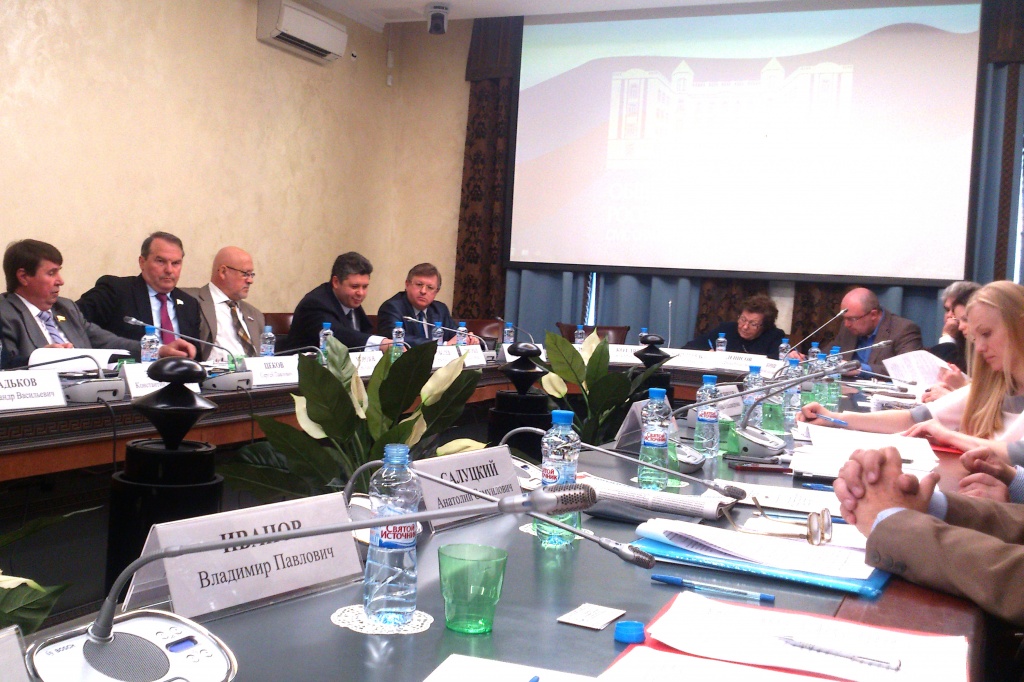
On May 12 the Civic Chamber of the Russian Federation held public hearings on the operations of Rossotrudnichestvo and other Russian and public organizations to support compatriots living outside Russia. The hearings were initiated by the Civic Chamber’s Commission on Public Diplomacy, which was created a little more than a year ago, together with the Institute of Diaspora and Integration (Institute of CIS Countries).
The speakers of the hearings who talked about their work with compatriots included representatives of both federal and municipal government bodies of Russia: senior representatives of Rossotrudnichestvo; the Russian Foreign Ministry’s Department of Compatriot Affairs; State Duma Committee on CIS Affairs, Eurasian Integration and Compatriot Relations; Federation Council’s Committee on International Affairs and Committee on Science, Education and Culture; Federal Migration Services of Russia and other structures.
The audience included representatives of leading Russian public and academic organizations, including the Fund for the Support and Protection of the Rights of Compatriots, Russian Peace Fund, Russkiy Mir Foundation, Moscow Compatriots House, Alexander Solzhenitsyn House of Russia Abroad and others.
The participants of the hearings noted that Russia has developed a strategy for supporting the Russian-speaking diaspora and the principles of support for compatriots have been clearly outlined by state structures and public organizations engaged in public diplomacy. These efforts began in 1994 and since then certain success has been achieved in this area.
According to Vladimir Goncharenko, Deputy Director of the Department of Compatriot Affairs, noted that the Government Commission on Compatriot Affairs meets once every quarter, the provisions of the State Program for Support of Compatriots are being elaborated and implemented, the World Coordination Council of Russian Compatriots has been established and meets on a regular basis, and regional and country conferences of compatriots are also held on a regular basis.
At the same time, the participants of the hearings pointed out a number of pressing issues which require constructive solutions.
“A serious need has emerged for increasing support of the Russian world on the part of Russian structures, and this support must be increased several fold,” said Leonid Slutsky, Chairman of the State Duma Committee on CIS Affairs, Eurasian Integration and Compatriot Relations. “At present a civilizations struggle is underway with the ideological opponents of the Russian world. The number of people in the world studying the Russian language is contracting, as Russian schools in Baltic countries, Central Asian countries and elsewhere close. The current situation in the Russian world runs contrary to the state interest of Russia.”
According to the parliamentarian, his committee has regularly raised the issue of increasing state financial support of compatriots but without any results. The corresponding state agency Rossotrudnichestvo reminds Slutsky of “a good automobile which knows where to go put that cannot get started because its fuel tank is empty.” It is no secret that the budget of Rossotrudnichestvo is nothing compared to the similar institutions of other countries, like Alliance Française and the Goethe Institute. The economic crisis in Russia has also impacted state financing of leading Russian funds engaged in the support of compatriots abroad.
At the same time it would be very unprofessional to limit the discussion of problems in this are exclusively to financial questions, the participants of the hearings noted.
The federal law on compatriots needs improvement as does the often ineffective methods of its implementation, in particular with regard to the simplified procedure of receiving Russian citizenship and retaining dual citizenship.
At present the Russian-speaking diaspora, according to the Russian Ministry of Foreign Affairs, numbers 30 million, 20 million of which live in CIS countries. One of the primary objectives of Russian state structures and public organizations is to protect the Russian communities abroad from losing their identity.
“Massive attempts are being made to use our compatriots to criticize the Russian Federation. We have returned to the times of the Cold War,” said Konstantin Zatulin, Director of the Institute of CIS Countries. “In countries of Eastern Europe and in former Soviet republics a policy of Rusophobia is actively being deployed, nationalism and xenophobia are blossoming, and antipathy toward the Russian world is encouraged, which greatly complicates our informational and organizational work toward supporting compatriots.”
“Providing assistance to Russian-speaking diasporas, to their cultural associations, language schools and Russian-language media – that is one of the top priorities of the Russkiy Mir Foundation, whose support can be provided to compatriots who identify themselves with Russia and help strengthen the country’s positive image abroad,” said Alexander Blinov, advisor to the executive director of the foundation. “Of the 5000 partners of the foundation across the world, a significant portion of them are compatriot organizations.”
The participants of the hearings emphasized the need for better coordination of efforts aimed at supporting compatriots by state structures and public organizations, with a differentiated and more professional approach to various categories of Russian compatriots.
The recommendations of the Civic Chamber’s Commission on Public Diplomacy and Support of Compatriots Abroad resulting from the public hearings will be sent to the Russian Presidential Administration, Russian Cabinet as well as the profile committees of the State Duma and Federation Council and various government departments and public organizations.
Editorial Department of the Russkiy Mir Foundation








